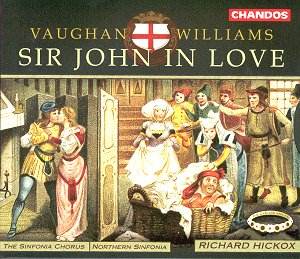
|
Ralph VAUGHAN WILLIAMS
(1872-1958) Sir John in Love (1928) Susan Gritton (soprano) Anne Page Sarah Connolly (mezzo soprano) Mrs Ford Stephen Varcoe (bass) Sir Hugh Evans Mark Padmore (tenor) Fenton Adrian Thompson (tenor) Slender Anne-Marie Owens (mezzo soprano) Mistress Quickly Laura Claycomb (soprano) Mrs Page Matthew Best (bass) Ford Northern Sinfonia Orchestra and Chorus Conductor: Richard Hickox Recorded 2000 |
When embarking on Sir John in Love, Vaughan Williams considered his greatest competition to be from Shakespeare, Verdi and Holst, but he might have added Nicolai and Elgar to the list. He, like Verdi and Nicolai before him, opted for the comic rather than the tragic figure of that well-loved character. It took many years to come to fruition, from 1913 to 1928, though the last four of those years saw serious work on the project. Sargent conducted the first performance, at the Royal College of Music on 21 March 1929. Though shadowing Shakespeare's Merry Wives of Windsor, Vaughan Williams also used other sources (such as Ben Jonson, Thomas Campion, Marlowe and even Psalm 137) to cover arias and choruses, and there is a fair sprinkling (ten) of English folktunes 'to enhance a dramatic point', a highlight being Sarah Connolly as Mrs Ford singing 'Greensleeves' in the third scene of Act Three. VW's characterisation of Falstaff lends him dignity, and underplays the buffoon, he is more lyrical than tragi-comic, he rumbles rather than sparkles, so it is no surprise that he changed the title from The Fat Knight to Sir John in love. Many of the other characters are fleshed out in more detail than in Verdi's opera.
Apart from the American Laura Claycomb (as Mrs Page) Chandos have assembled a British cast of names largely familiar to the opera/oratorio scene here; there are no weak links and the result is highly successful with excellent orchestral playing by the Northern Sinfonia under the indefatigable Richard Hickox, who includes Vaughan Williams among his many British specialities. The disc does its best to provide atmosphere, such as sound effects, distance etc and there are delightful cameos such as Stephen Varcoe's over-the-top Welsh parson, and Anne-Marie Owens as the plump-voiced Mistress Quickly. The music has ravishing moments, Vaughan Williams is at his best when love and passion are driving the drama (the Fifth Symphony and the Tallis Fantasia are frequently brought to mind) though there are also longueurs. But you need only to listen to the glorious, virginally fresh voice of Susan Gritton as Anne Page, and Mark Padmore as her ardent lover in the role of Fenton to forget about them.
Christopher Fifield
Editor's Note
You may wish to compare this set with the excellent EMI recording by Meredith Davies from the 1970s. CMS 566123 2.
If there is anyone out there who would be able to provide a comparative review of the two sets then we would be happy to include that on the site as well.
Please contact the editor at rob.barnett@ukgateway.net